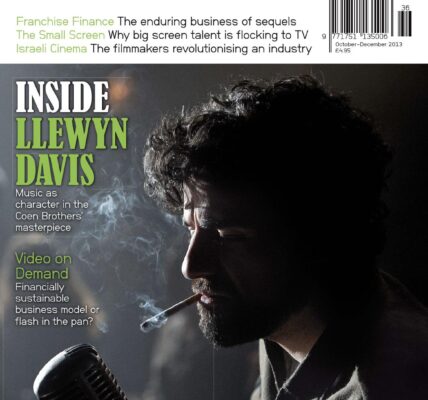KinoNation is currently doing research into the financial realities of VoD. How challenging has that been?
It’s really difficult to research. We are lucky because we have our own data; hundreds of films from all over the world that we are putting them onto multiple different VoD platforms. That informs us about what works and what doesn’t. But the million dollar question people always ask me is ‘I’m a producer. I have this film. Can you give me an indication of how much money it will make on VoD?’. Which is still next to impossible to answer.
About six months ago we hired Rufus Williams, Australian filmmaker who also has a PHD in statistics from both Oxford and Harvard, to build us a metric-based ranking system which we’re calling KinoFactor. It’s still very much a work in progress; an attempt to provide an objective, numerically-based ranking system that doesn’t have the subjectivity of a curator. Basically, it takes various aspects of a particular film, how many festivals it has played in, the talent attached, the producer’s track record, the IMDB rating, social media presence, etc.and gives it a score out of 100. When we show that to producers, it can be a bit of a wake-up call, but they have to understand that there aren’t many films that get 99 out of 100! It’s a useful tool for them, and it’s a useful tool for our VoD outlets; because we have so many films in our catalogue, it’s hard for those who want to cherry pick the ones they think will perform best.
With so many VoD platforms out there, how should a filmmaker be choosing when and where to release their film?
First of all it makes sense for filmmakers to be sophisticated in their release date scheduling with VoD. They should be thinking about windowing. A film that’s in post now, for example, a filmmaker should be thinking ‘From around January or February 2014, I want to be on exclusively the transactional sites when I’ll do marketing push one.’ And they need to make sure that their pricing is consistent; it just sends confusing signals to the market if it’s £2.99 on one site for a 48 hour rental and £3.99 on another site. They should then define a second window, which would be opening it up to subscription and advertising supported sites.
So windowing didn’t go away; in fact, it’s thriving. It’s still the way the studios do it now; theatrical, sometimes day and date VoD, sometimes even ultra-releases, which is VoD before theatrical, followed by DVD and then the Pay-Per-View / subscription based VoD window.
With all this work that has to go in to making VoD a success, and with an industry that is constantly changing, do you think VoD is a financially sustainable way for the industry to evolve?
That’s a really good question. In my opinion, VoD is, in the short term, not going to pick up the slack that has been lost on the DVD sales side. The margins on DVDs were huge, and we’re not seeing that with VoD. Of course, people are less inclined to spend the premium money on downloading a film for unlimited viewing, because it’s not resulting in a tangible product on a shelf in your living room.
The question that gets asked all the time is, is Video on Demand going to provide a viable income stream for filmmakers, so they can actually make a living out of making movies? The answer is yes, for some, but no for most. We are living in a world of an over-abundance of supply, so it’s very difficult to hit the home run… but not impossible.
Peter Gerard
CEO, Distrify
How have you seen changing audience habits driving VoD?
People want to be able to watch what they want, whenever they want, wherever they want. We founded Distrify due to the realisation that impulse purchases for films had previously been impossible. Our philosophy is that whenever someone sees a movie trailer for the first time, they should be able to pay to see the film. We’ve seen the demand for impulse purchases grow, particularly as more people shift from DVDs to internet streaming.
Do you see VoD as being part of an overall strategy which still includes theatrical, or is the theatrical model becoming increasingly outdated?
Most research indicates that theatrical ticket sales will continue to grow over the next few years. We designed our tools to embrace a multi-platform release and love to see people organising screenings or buying cinema tickets through our players. We see a growing interest in day-and-date releases and in films coming to theatres after an online release. At the end of the day, every release depends on the individual film, and its audience and the strategy needs to be defined on a case-by-case basis.
It’s clear from our experience and from publicly available research that there is a growing demand for VoD across the globe. We still sell DVDs and other merchandise, but instant streaming makes up the majority of our sales by far.
Do audiences consume VoD releases in the same way as theatrical; is there as much emphasis on watching things immediately, for example?
People’s attention spans are pretty short these days, and the noise of social media, email spam and online advertising can be very distracting. A film can blow up and then disappear again very quickly. Still, there is potential for a film being rediscovered and effectively having many ‘premieres’, as different blogs or websites promote a film at different times and introduce it to new groups of people.
Fundamentally, if you don’t have a studio-level advertising budget, waiting a few weeks to a few months from theatrical release to home entertainment is generally not going to work. With smaller budgets you can usually only afford one big push, and you want all possibilities for purchase to be available immediately, since you probably cannot afford to re-market to people.
VoD is still evolving, and there is not a great deal of information available about the business side of it. Is it a sustainable model for the future of cinema?
VoD is a growing and sustainable part of the business. For ultra-low-budget films, you can earn your money back and go into profit online. For most films, VoD fits into a wider strategy of distribution that includes all the traditional outlets online and offline. Planning a windowing strategy that maximises revenue is still key; e.g. moving from transactional to subscription and eventually advertising over the course of a year or two.
We are pleased to have worked with several low-budget filmmakers who are using the revenue earned with us to produce their next films, and we anticipate more and more filmmakers earning their living from VoD in the years to come. It’s not going to happen overnight, but if filmmakers keep their expectations measured and their strategies holistic, they can achieve great things with VoD as a key part of their overall release plan.
 Yan Vizinberg
Yan Vizinberg
Co-Founder & CEO, Cinecliq
Cinecliq is an on-demand platform that’s fully integrated into Facebook. How do you think social media is redefining the way audiences discover and watch films?
The industry is at a point where everyone understands the importance of social media and its unique role in helping viewers discover content. There aren’t too many people, however, who have a deep understanding of how to harness the power of Facebook, Twitter and other social media tools. As with any other campaign, a social media campaign requires careful planning and artful implementation; then it can yield results and provide a very high ROI.
Do audiences consume VoD releases in the same way as theatrical; is there as much emphasis on watching things immediately, for example?
In many ways VoD film consumption mimics theatrical. Most people are seeking newer titles that are being advertised and promoted. But many library films that were dormant for decades will find a new life on VoD. Quality films, similar to classic books, will always be popular as new generations grow up and discover them.
We see more success with niche films as their audiences are easy to identify, easy to market to, and are willing to spread the word about the films within their interest group. More generic titles compete with Hollywood, but lack the necessary marketing support that the studios can provide.
VoD is still evolving, and there is not a great deal of information available about the business side of it. Is it a sustainable model for the future of cinema?
VoD is still a very young industry. Most players are just finding their way and discovering opportunities. It’s an expanding industry that is spreading across the world, inventing new models of content consumption, and converting millions of people into VoD consumers. Companies who think strategically and those who are ready for the long haul will eventually reap the rewards.











